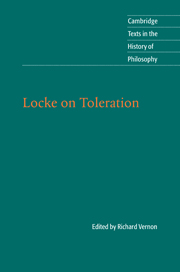Book contents
- Frontmatter
- Contents
- Acknowledgements
- Introduction
- Chronology
- Further reading
- Note on the texts and translation
- Locke on Toleration
- Locke: A Letter concerning Toleration
- Locke: From the Second Treatise (in Two Treatises of Government, 2nd edn, 1698)
- Locke: From An Essay concerning Human Understanding (4th edn, 1700)
- Proast: The Argument of the Letter concerning Toleration, Briefly Considered and Answered (1690)
- Locke: From A Second Letter concerning Toleration (1690)
- Proast: From A Third Letter concerning Toleration in Defence of the Argument of the Letter concerning Toleration, Briefly Considered and Answered (1691)
- Locke: From A Third Letter for Toleration (1692)
- Proast: From A Second Letter to the Author of the Three Letters for Toleration (1704)
- Locke: From A Fourth Letter for Toleration (1704)
- Index
- Titles in the series
Locke: From An Essay concerning Human Understanding (4th edn, 1700)
Published online by Cambridge University Press: 05 June 2012
- Frontmatter
- Contents
- Acknowledgements
- Introduction
- Chronology
- Further reading
- Note on the texts and translation
- Locke on Toleration
- Locke: A Letter concerning Toleration
- Locke: From the Second Treatise (in Two Treatises of Government, 2nd edn, 1698)
- Locke: From An Essay concerning Human Understanding (4th edn, 1700)
- Proast: The Argument of the Letter concerning Toleration, Briefly Considered and Answered (1690)
- Locke: From A Second Letter concerning Toleration (1690)
- Proast: From A Third Letter concerning Toleration in Defence of the Argument of the Letter concerning Toleration, Briefly Considered and Answered (1691)
- Locke: From A Third Letter for Toleration (1692)
- Proast: From A Second Letter to the Author of the Three Letters for Toleration (1704)
- Locke: From A Fourth Letter for Toleration (1704)
- Index
- Titles in the series
Summary
Book iv, Chapter 13: Some farther considerations concerning our knowledge
§1. Our knowledge, as in other things, so in this, has so great a conformity with our sight, that it is neither wholly necessary nor wholly voluntary. If our knowledge were altogether necessary, all men's knowledge would not only be alike, but every man would know all that is knowable: and if it were wholly voluntary, some men so little regard or value it, that they would have extreme little or none at all. Men that have senses cannot choose but receive some ideas by them; and if they have memory, they cannot but retain some of them; and if they have any distinguishing faculty, cannot but perceive the agreement or disagreement of some of them one with another: as he that has eyes, if he will open them by day, cannot but see some objects, and perceive a difference in them. But though a man with his eyes open in the light cannot but see, yet there be certain objects, which he may choose whether he will turn his eyes to; there may be in his reach a book containing pictures and discourses, capable to delight or instruct him, which yet he may never have the will to open, never take the pains to look into.
§2. There is also another thing in a man's power, and that is, though he turns his eyes sometimes towards an object, yet he may choose whether he will curiously survey it, and with an intent application endeavour to observe accurately all that is visible in it.
- Type
- Chapter
- Information
- Locke on Toleration , pp. 50 - 53Publisher: Cambridge University PressPrint publication year: 2010
- 1
- Cited by

